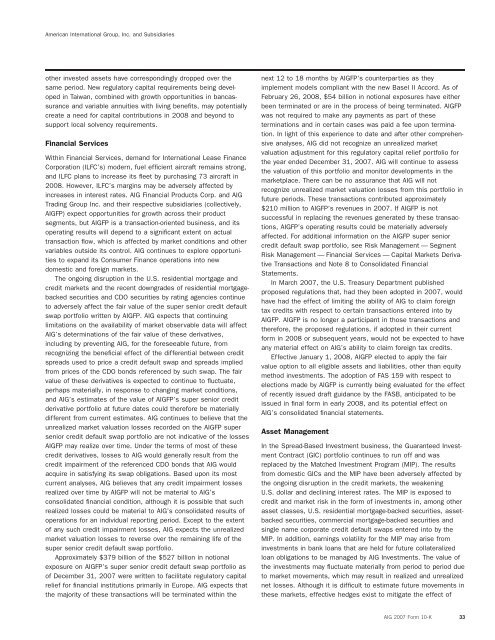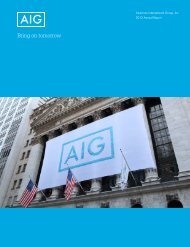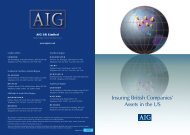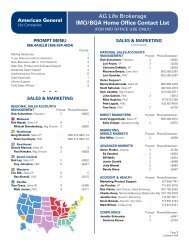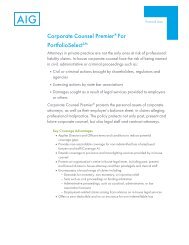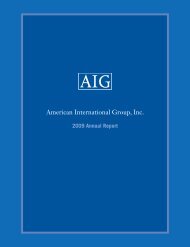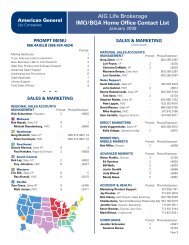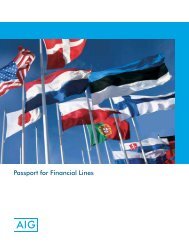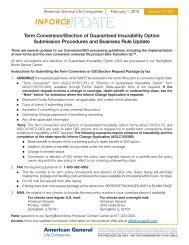2007 Annual Report - AIG.com
2007 Annual Report - AIG.com
2007 Annual Report - AIG.com
Create successful ePaper yourself
Turn your PDF publications into a flip-book with our unique Google optimized e-Paper software.
American International Group, Inc. and Subsidiaries<br />
next 12 to 18 months by <strong>AIG</strong>FP’s counterparties as they<br />
implement models <strong>com</strong>pliant with the new Basel II Accord. As of<br />
February 26, 2008, $54 billion in notional exposures have either<br />
been terminated or are in the process of being terminated. <strong>AIG</strong>FP<br />
was not required to make any payments as part of these<br />
terminations and in certain cases was paid a fee upon termination.<br />
In light of this experience to date and after other <strong>com</strong>prehensive<br />
analyses, <strong>AIG</strong> did not recognize an unrealized market<br />
valuation adjustment for this regulatory capital relief portfolio for<br />
the year ended December 31, <strong>2007</strong>. <strong>AIG</strong> will continue to assess<br />
the valuation of this portfolio and monitor developments in the<br />
marketplace. There can be no assurance that <strong>AIG</strong> will not<br />
recognize unrealized market valuation losses from this portfolio in<br />
future periods. These transactions contributed approximately<br />
$210 million to <strong>AIG</strong>FP’s revenues in <strong>2007</strong>. If <strong>AIG</strong>FP is not<br />
successful in replacing the revenues generated by these transac-<br />
tions, <strong>AIG</strong>FP’s operating results could be materially adversely<br />
affected. For additional information on the <strong>AIG</strong>FP super senior<br />
credit default swap portfolio, see Risk Management — Segment<br />
Risk Management — Financial Services — Capital Markets Deriva-<br />
tive Transactions and Note 8 to Consolidated Financial<br />
Statements.<br />
In March <strong>2007</strong>, the U.S. Treasury Department published<br />
proposed regulations that, had they been adopted in <strong>2007</strong>, would<br />
have had the effect of limiting the ability of <strong>AIG</strong> to claim foreign<br />
tax credits with respect to certain transactions entered into by<br />
<strong>AIG</strong>FP. <strong>AIG</strong>FP is no longer a participant in those transactions and<br />
therefore, the proposed regulations, if adopted in their current<br />
form in 2008 or subsequent years, would not be expected to have<br />
any material effect on <strong>AIG</strong>’s ability to claim foreign tax credits.<br />
Effective January 1, 2008, <strong>AIG</strong>FP elected to apply the fair<br />
value option to all eligible assets and liabilities, other than equity<br />
method investments. The adoption of FAS 159 with respect to<br />
elections made by <strong>AIG</strong>FP is currently being evaluated for the effect<br />
of recently issued draft guidance by the FASB, anticipated to be<br />
issued in final form in early 2008, and its potential effect on<br />
<strong>AIG</strong>’s consolidated financial statements.<br />
other invested assets have correspondingly dropped over the<br />
same period. New regulatory capital requirements being developed<br />
in Taiwan, <strong>com</strong>bined with growth opportunities in bancassurance<br />
and variable annuities with living benefits, may potentially<br />
create a need for capital contributions in 2008 and beyond to<br />
support local solvency requirements.<br />
Financial Services<br />
Within Financial Services, demand for International Lease Finance<br />
Corporation (ILFC’s) modern, fuel efficient aircraft remains strong,<br />
and ILFC plans to increase its fleet by purchasing 73 aircraft in<br />
2008. However, ILFC’s margins may be adversely affected by<br />
increases in interest rates. <strong>AIG</strong> Financial Products Corp. and <strong>AIG</strong><br />
Trading Group Inc. and their respective subsidiaries (collectively,<br />
<strong>AIG</strong>FP) expect opportunities for growth across their product<br />
segments, but <strong>AIG</strong>FP is a transaction-oriented business, and its<br />
operating results will depend to a significant extent on actual<br />
transaction flow, which is affected by market conditions and other<br />
variables outside its control. <strong>AIG</strong> continues to explore opportunities<br />
to expand its Consumer Finance operations into new<br />
domestic and foreign markets.<br />
The ongoing disruption in the U.S. residential mortgage and<br />
credit markets and the recent downgrades of residential mortgage-<br />
backed securities and CDO securities by rating agencies continue<br />
to adversely affect the fair value of the super senior credit default<br />
swap portfolio written by <strong>AIG</strong>FP. <strong>AIG</strong> expects that continuing<br />
limitations on the availability of market observable data will affect<br />
<strong>AIG</strong>’s determinations of the fair value of these derivatives,<br />
including by preventing <strong>AIG</strong>, for the foreseeable future, from<br />
recognizing the beneficial effect of the differential between credit<br />
spreads used to price a credit default swap and spreads implied<br />
from prices of the CDO bonds referenced by such swap. The fair<br />
value of these derivatives is expected to continue to fluctuate,<br />
perhaps materially, in response to changing market conditions,<br />
and <strong>AIG</strong>’s estimates of the value of <strong>AIG</strong>FP’s super senior credit<br />
derivative portfolio at future dates could therefore be materially<br />
different from current estimates. <strong>AIG</strong> continues to believe that the<br />
unrealized market valuation losses recorded on the <strong>AIG</strong>FP super<br />
senior credit default swap portfolio are not indicative of the losses<br />
<strong>AIG</strong>FP may realize over time. Under the terms of most of these<br />
credit derivatives, losses to <strong>AIG</strong> would generally result from the<br />
credit impairment of the referenced CDO bonds that <strong>AIG</strong> would<br />
acquire in satisfying its swap obligations. Based upon its most<br />
current analyses, <strong>AIG</strong> believes that any credit impairment losses<br />
realized over time by <strong>AIG</strong>FP will not be material to <strong>AIG</strong>’s<br />
consolidated financial condition, although it is possible that such<br />
realized losses could be material to <strong>AIG</strong>’s consolidated results of<br />
operations for an individual reporting period. Except to the extent<br />
of any such credit impairment losses, <strong>AIG</strong> expects the unrealized<br />
market valuation losses to reverse over the remaining life of the<br />
super senior credit default swap portfolio.<br />
Approximately $379 billion of the $527 billion in notional<br />
exposure on <strong>AIG</strong>FP’s super senior credit default swap portfolio as<br />
of December 31, <strong>2007</strong> were written to facilitate regulatory capital<br />
relief for financial institutions primarily in Europe. <strong>AIG</strong> expects that<br />
the majority of these transactions will be terminated within the<br />
Asset Management<br />
In the Spread-Based Investment business, the Guaranteed Invest-<br />
ment Contract (GIC) portfolio continues to run off and was<br />
replaced by the Matched Investment Program (MIP). The results<br />
from domestic GICs and the MIP have been adversely affected by<br />
the ongoing disruption in the credit markets, the weakening<br />
U.S. dollar and declining interest rates. The MIP is exposed to<br />
credit and market risk in the form of investments in, among other<br />
asset classes, U.S. residential mortgage-backed securities, asset-<br />
backed securities, <strong>com</strong>mercial mortgage-backed securities and<br />
single name corporate credit default swaps entered into by the<br />
MIP. In addition, earnings volatility for the MIP may arise from<br />
investments in bank loans that are held for future collateralized<br />
loan obligations to be managed by <strong>AIG</strong> Investments. The value of<br />
the investments may fluctuate materially from period to period due<br />
to market movements, which may result in realized and unrealized<br />
net losses. Although it is difficult to estimate future movements in<br />
these markets, effective hedges exist to mitigate the effect of<br />
<strong>AIG</strong> <strong>2007</strong> Form 10-K 33


